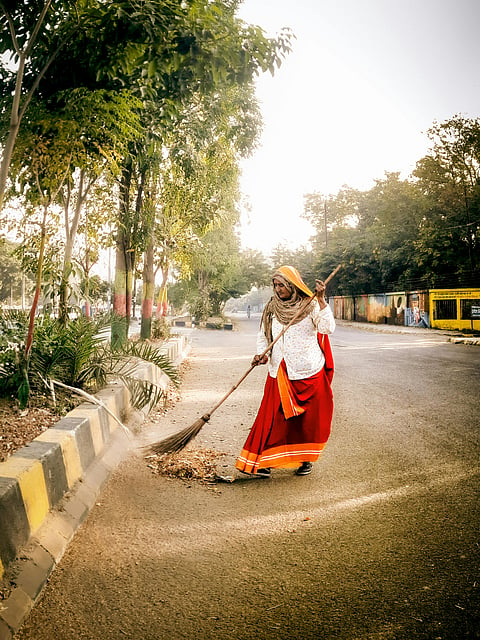

The two fault lines in Hinduism are caste and gender. Speaking from within the faith—and not at all as an outsider with a hostile agenda—I would like to share a few personal observations on how this widely affects us as a society, of whatever creed. It is no secret that other faiths also have hierarchies, though that’s rarely discussed, unlike those of the majority.
My first memory of life is a tight slap on the face at four. My father’s elder sister slapped me. My mother and father said nothing, their faces impassive. The reason for the slap? Without knowing the meaning, I had called our cleaning lady a “shudrachi”, a term picked up from our cook. “Never say that again,” said my aunt into the silence. Trained already in appropriate responses, it seems I said “sorry” in a small voice and returned to my toys. We lived in Calcutta in those days. The next day, my mother bought a train ticket back to Madras for the cook and fired him as a bad influence on her household.
Children innocently pick up wrong words from their family and environment. So, wouldn’t you agree that it absolutely behoves us, as responsible citizens—young or old—to refrain from using derogatory terms or hate speech, which perpetuates negativity? If we truly follow the tenets of the Hindu faith, which exalts Mahavishnu as all-pervasive and present in every being, we would respect everyone’s right to dignity and polite behaviour, would we not? My grandmother and my mother told me, in particular, to always speak gently and affectionately to eunuchs and transgender people. So, I was never afraid of them, and they, too, gave such lovely blessings. My mother also taught me by example not to serve house-help in separate cups and plates. It’s rude—and absurd, given how we commonly eat out and order in.
Schooled by my elders that politeness was non-negotiable, I was startled recently by ‘Bablu of Jaunpur’, my building manager, who hails from eastern Uttar Pradesh. He said in Hindi, “Everyone laughs at you because you say Namaste even to the dhobi (the press-wala), the sweeper, the mali (gardener), and the vegetable man.”
“What’s so funny?” I asked, surprised. “Have you no sense of being a memsahib?” he asked scornfully. “No, this is a democracy,” I said, wholly taken aback but sure of my stand. I thought over his peculiar statement. If I were such a figure of fun, my dhobi and his wife would not smile sweetly and greet me back. Nor would my little pet, their daughter Sona, shyly disclose that she’d gone to Class Three, or Madhu, her mother, proudly tell me that Sona had come first in class.
My Sunday gardener, Badri, would not, unasked, bring me plants that I fancied but didn’t have—like lemon grass and poppies. Nor would he and his little boy, Vaibhav, bring me boondi as Tuesday prasad from the Hanuman temple he visits when free from his day job as a gardener in a big hotel. So, I put down Bablu’s extraordinary remark on the mores of the feudal society he obviously comes from. When that mindset will change is anybody’s guess, and I suddenly felt quite tired of it all. I had had caste slapped out of me as an ignorant child—but how can one person take responsibility for 1.4 billion people? One can only work on one’s own mindset and its consequent behaviour.
The other fault line in our society—gender—is, hopefully, being steadily erased. Here, I must express my profound gratitude to all the enlightened Hindu fathers who let their girls out of the box to study, travel, and work—bravely opposing the orthodox people around them and the usual objection of “What will people say?” A hundred years ago, I would have led a stunted life as an Indian woman, whereas today, I rejoice in several important freedoms, thanks to Hindu reform—secure in the knowledge that the law of the land is firmly on the side of Indian women of all creeds. I would earnestly urge the various patriarchies not to straggle behind the law and the Constitution’s marg darshan (vision of the path) because this change, too, is unstoppable.
I think the caste system also explains why Indians largely lack civic sense. For centuries, people have thrown rubbish where they pleased because it was always somebody else’s job to remove it. It would be a giant leap for Indians if we started owning our rubbish and taking responsibility for its correct disposal. The government may talk itself hoarse about Swachh Bharat, but unless we truly participate in it, we will continue to be mocked by the whole world for how dirty we are. I say this with apologies to all the conscientious citizens who dispose of their garbage properly and teach their young not to litter.
Visiting a place like Bali—physically and culturally similar to India—breaks your heart because you see how beautiful India would look if we all kept our motherland clean. At best, we can urge our law enforcers and civic bodies to hold the mess-makers sternly accountable so that they mend their ways. It is so heartening to see videos of the clean places in our North-East or read that Indore is rated as the cleanest city, and beaches in Odisha are top-rated as litter-free. Let’s hope that we all catch up soon with positive change.
(Views are personal)
(shebaba09@gmail.com)
Renuka Narayanan